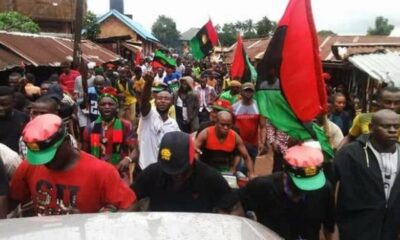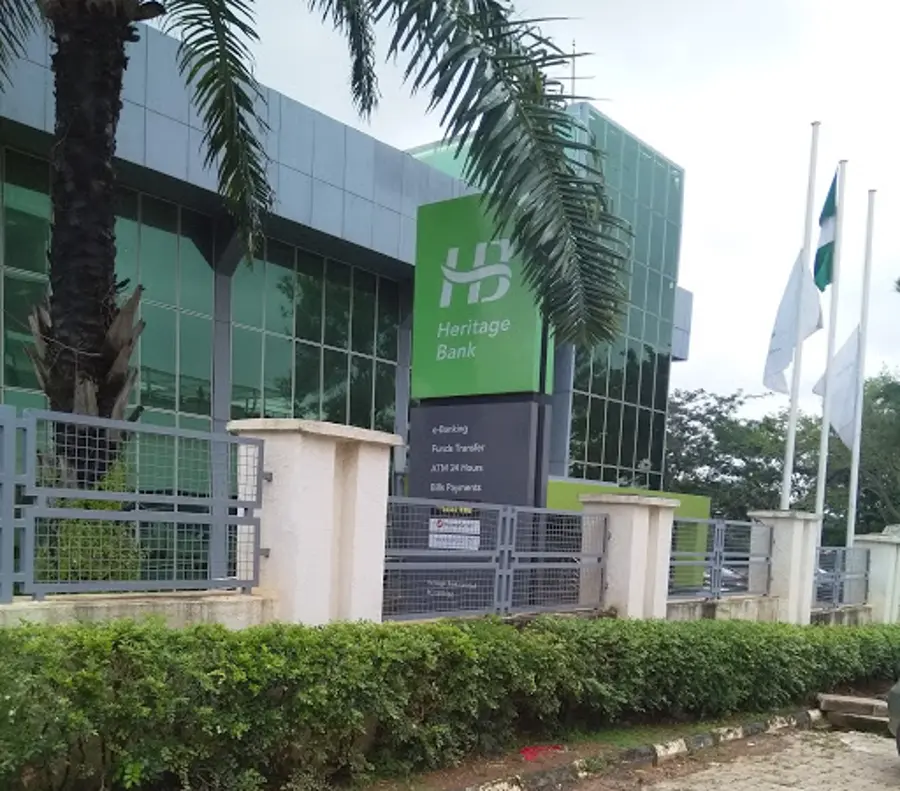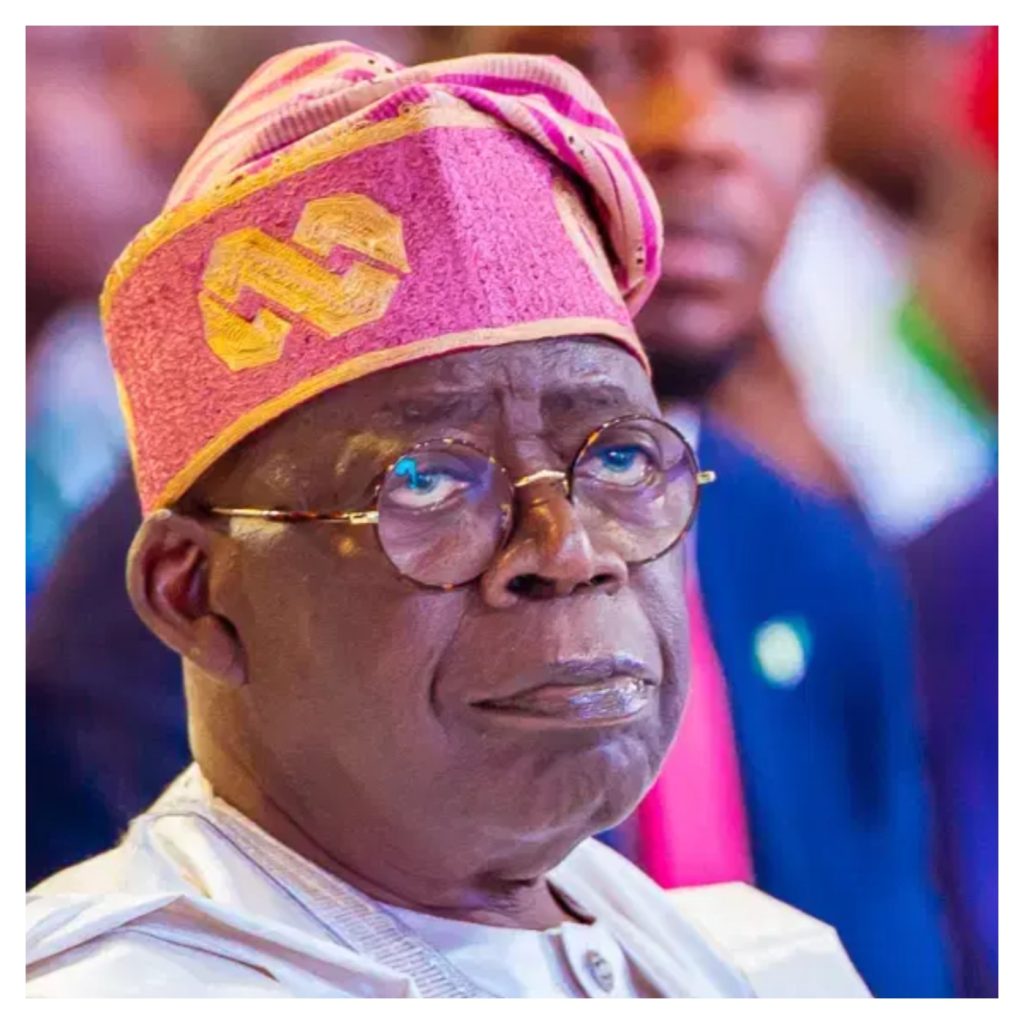Business
Breaking : Customers Drag Firstbank Over Frequent Debit Alerts
Published
7 months agoon
By
Ekwutos BlogSome customers of First Bank Plc have taken to social media to drag the bank over what they described as unnecessary debits from the money-keeping giant.
In several reactions on their Facebook page, @First Bank of Nigeria Limited on Sunday, the customers expressed their frustration over uncountable debits from the bank in the last two weeks.
One of the customers, Udoh Blessing, who reacted to the bank’s latest post on how to access quick loans wrote, “I’ve been noticing debit alerts this day saying it’s for QS with some digit including my phone number/MTN: USSD Something Something. What’s that for please cos I didn’t recharge via the line and keep receiving debit alerts of #200, 139, 34, 100 and so on. It’s getting out of hand o please”
Another customer, Esther Maurice who narrated her frustration commented “Please oh First Bank of Nigeria, what is the Meaning of MTN: USSD and so on Debit.? Cause I’m going crazy here. I’ve been debited more than 10 times this month, what is it all about? It’s becoming unbearable oh. Is it now bank that we will be suffering in this country.?”
“Please first bank of Nigeria what is going on? I keep getting debits regularly what is going on I can’t keep money in my account and have the rest of my mind. Someone sent me 1,500 only for me to come back the next day and my balance is remaining 900 out of the money sent. Is not fair, you people should look into it” Irreplaceable Gichi commented.
On his part, Stephen Ochoche wrote “First Bank of Nigeria Limited I was debited 4 times within two weeks without making transactions. This issue is becoming worse and it seems our funds are no longer safe”
“This day I am receiving a reasonable debit alert from you. I need more clarity please” Ali Muhammad requested.
However, the bank while responding to each of the comments that lamented over the frequent debit urged their customers to check their Direct message (DM) for the bank’s response.
Our correspondent who monitored the conversation gathered that the financial giant replied to their customers within two minutes of complaining on their page with a message which reads, “Hi (name of customer), thank you for contacting us and we empathise with you on the issue raised.
“Please provide your account number, amount, and date to enable us to query and advise as appropriate. We regret any inconvenience this may have caused you while reiterating our commitment to serve you better.
“For urgent assistance, log dispense error via https://complaints.firstbanknigeria.com or call FirstContact on 0700FIRSTCONTACT, +234 708 062 5000 or +234 2 01448 5500 to use our IVR self-service options to block your card or account, log dispense errors or track status of existing complaints.”
You may like
No bombs, guns, attack plans – IPOB reacts to evidence presented against Nnamdi Kanu


Arsenal vs PSG: TV channel, kick off time & how to watch for free


Gunmen kill physiotherapist on duty in UBTH


Biafra agitators fume as US ambassador meets leadership of Fulani herdsmen


Biafra: We’ll prove Nnamdi Kanu committed no offense – IPOB lawyers


NEMA receives 203 Nigerians stranded in Libya
Business
NDIC commences payout to defunct Heritage Bank top depositors
Published
1 day agoon
April 28, 2025By
Ekwutos Blog
The Nigeria Deposit Insurance Corporation, NDIC, has begun payment of N46.6 billion as the first tranche of liquidation dividends to depositors of the defunct Heritage Bank, whose funds exceeded the maximum insured limit of N5 million.
The acting Head of Communication and Public Affairs of NDIC, Hawwau Gambo, made this announcement in a statement on Sunday.
Ekwutosblog reports that the Central Bank of Nigeria revoked the banking license of Heritage Bank on June 3, 2024, citing regulatory infractions.
The NDIC, shortly after the revocation had commenced the payment of insured deposits, promptly reimbursing depositors up to the N5m insured threshold.
According to the NDIC, the payment of the first tranche of liquidation dividends started on Friday, April 25, 2025, and is aimed at ensuring that all eligible depositors of the closed bank are adequately reimbursed.
“In its continued commitment to ensuring that depositors of the defunct Heritage Bank are fully reimbursed, the Nigeria Deposit Insurance Corporation has declared the first tranche of liquidation dividends totaling N46.6bn from the proceeds of sales of the defunct bank’s assets and recovery of debts owed to the defunct institution,” the statement read.
The Corporation noted that the liquidation dividend represents the amount paid to depositors from the proceeds realised from the sale of the bank’s assets and recovery of outstanding debts, in excess of the maximum insured limit.
It explained that it could also include amounts eventually paid to creditors and shareholders after all depositors have been fully settled.
The NDIC, while providing details on the mode of payment, stated that the initial dividend was disbursed at the rate of 9.2 kobo per Naira on a pro-rata basis to the depositors whose account balances exceeded the NDIC’s maximum insured limit of N5.0m as at the time of the bank’s closure.
“To ensure seamless and efficient payment process, the NDIC used the depositors’ Bank Verification Number to locate alternate account numbers of depositors in other banks and automatically credited them with the insured amount,” the Corporation said.
The NDIC noted that it also relied on the verified records used during the insured deposit payment phase to facilitate the liquidation dividend disbursement.
It, however, urged depositors whose balances exceeded N5m and who have yet o receive the first tranche of liquidation dividends to contact the Corporation.
The Corporation also called on depositors who did not maintain an alternate bank account and who had not received even their insured deposits to visit any NDIC office or download and complete a deposit verification form from its website for processing.
Business
US government reveals major barrier to trading and investing in Nigeria
Published
1 day agoon
April 28, 2025By
Ekwutos Blog
The United States government has pointed out the major stumbling block to trade and investment in Nigeria.
According to US authorities, corruption is the major barrier preventing trading and investing in Nigeria.
Speaking in the latest 2025 National Trade Estimate Report on Foreign Trade Barriers, the Office of the United States Trade Representative said corruption and lack of transparency in tender processes are major concerns to U.S. companies. Nigerian home decor ideas
It stated: “U.S. firms experience difficulties in day-to-day operations as a result of inappropriate demands from officials for ‘facilitative’ payments.
“Efforts to strengthen anticorruption measures have been hampered by inter-ministerial infighting and partisan politics.
“Questions also remain regarding the Nigerian justice system’s capacity to achieve convictions and appropriate sentencing for corruption-related crimes.”
The continued delay in approving import permits for American agricultural products was also blamed on Nigeria, with the U.S. authorities calling the issue a longstanding trade barrier that has hindered access to the Nigerian market.
According to the report, Nigeria had not acted on several pending requests concerning food and agricultural imports from the US despite repeated efforts to secure market access.
“Since 2019, the United States has sought to negotiate import permits for the export of several categories of US food and agricultural products. Nigeria has been slow to approve these requests,” the US National Trade Estimate Report on Foreign Trade Barriers said. Nigerian home decor ideas
“Nigeria is not consistent in the implementation of technical regulations and sanitary and phytosanitary measures, which can create confusion and undermine compliance.
“Nigeria maintains a combined duty plus other associated import fees of 50 per cent or more on 79 tariff lines.
“These include 17 tariff lines on which the combined duty plus other associated import fees reach or surpass the 70 per cent limit set by ECOWAS,” it added.
Business
PIA: Support independent regulatory institutions in oil and gas sector – Group to Tinubu
Published
2 days agoon
April 27, 2025By
Ekwutos Blog
The Nigeria Oil and Gas Integrity Forum has called on President Bola Tinubu to continue to support independent regulatory institutions like the Nigerian Upstream Petroleum Regulatory Commission, NUPRC, noting that Nigeria must build strong institutions and not strong individuals.
The forum in a press statement also urged stakeholders across the sector to work hand-in-hand with the Commission to consolidate the gains achieved so far.
President of the forum, Vivian Okorafor, while noting the critical and patriotic role of NUPRC in steering the successful implementation of the Petroleum Industry Act, PIA, said the law has become the nation’s saving grace in the oil and gas sector.
Okorafor claimed the PIA law would have meant little without the “visionary, competent and firm regulatory leadership” demonstrated by the NUPRC and its leadership.
“The PIA was a monumental achievement, but the real success story is what followed. Without the solid and transparent enforcement of the law by NUPRC, we would still be grappling with regulatory uncertainties, capital flight, and investor distrust. Today, because of strong leadership at the NUPRC, Nigeria’s upstream sector has regained the confidence of both local and international investors,” the statement reads.
“In the past, regulatory opacity drained our oil industry of investments. But NUPRC has reversed that trend. Transparent bid rounds, clear licensing processes, streamlined procedures — these have restored faith in Nigeria’s petroleum sector and placed us on a competitive global footing once again,” Okorafor said.
She also highlighted the Commission’s focus on promoting Nigerian content and encouraging indigenous companies, saying these steps were crucial for broad-based economic development.
“Technology is now being deployed smartly to plug leakages. Licensing, reporting, and monitoring are now largely digital, making it difficult for underhand dealings to thrive. This is part of the transformational thinking that the NUPRC leadership has brought into the regulatory ecosystem.” she added.
Okorafor noted that one of the most critical impacts of the PIA implementation has been the new fiscal regime that now makes Nigeria a more attractive destination for upstream investments compared to the pre-PIA era.
“Before the PIA and the new fiscal frameworks enforced by NUPRC, Nigeria was losing out to other African nations like Angola and Ghana,” she explained.
“We urge Mr President to shield institutions like the NUPRC from political interference. Nigeria must build strong institutions, not strong individuals. Komolafe and his team have shown what can happen when professionalism is allowed to lead. We must nurture and protect that.
“No law is perfect. No reform is ever completely painless. But with the firm handling of the PIA, Nigeria has a chance to write a new chapter in its oil and gas history — one marked by transparency, growth, and shared prosperity.”
No bombs, guns, attack plans – IPOB reacts to evidence presented against Nnamdi Kanu

Arsenal vs PSG: TV channel, kick off time & how to watch for free

Gunmen kill physiotherapist on duty in UBTH
Trending

 Trending6 months ago
Trending6 months agoNYA demands release of ‘abducted’ Imo chairman, preaches good governance
- Business6 months ago
US court acquits Air Peace boss, slams Mayfield $4000 fine

 Politics6 months ago
Politics6 months agoMexico’s new president causes concern just weeks before the US elections
- Entertainment6 months ago
Bobrisky transferred from Immigration to FCID, spends night behind bars
- Entertainment6 months ago
Bobrisky falls ill in police custody, rushed to hospital

 Politics6 months ago
Politics6 months agoRussia bans imports of agro-products from Kazakhstan after refusal to join BRICS

 Politics6 months ago
Politics6 months agoPutin invites 20 world leaders
- Politics1 year ago
Nigerian Senate passes Bill seeking the establishment of the South East Development Commission.

